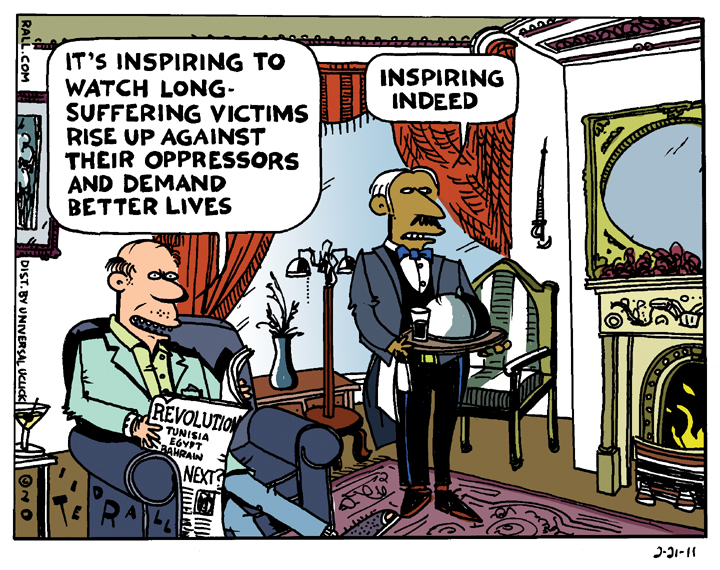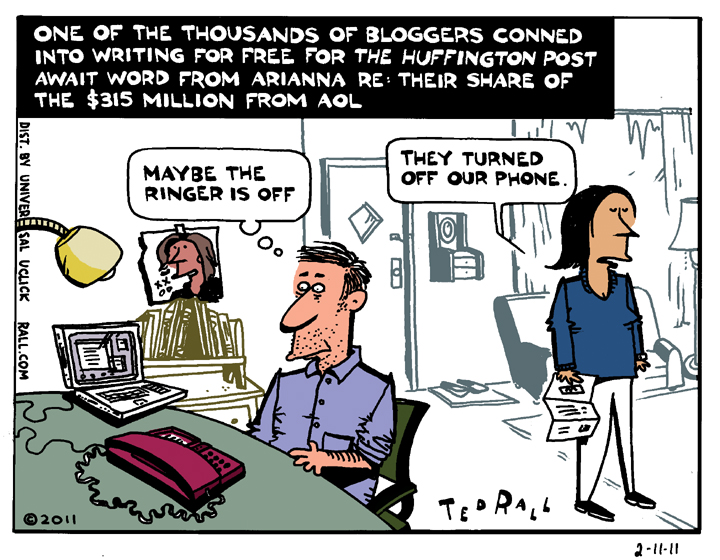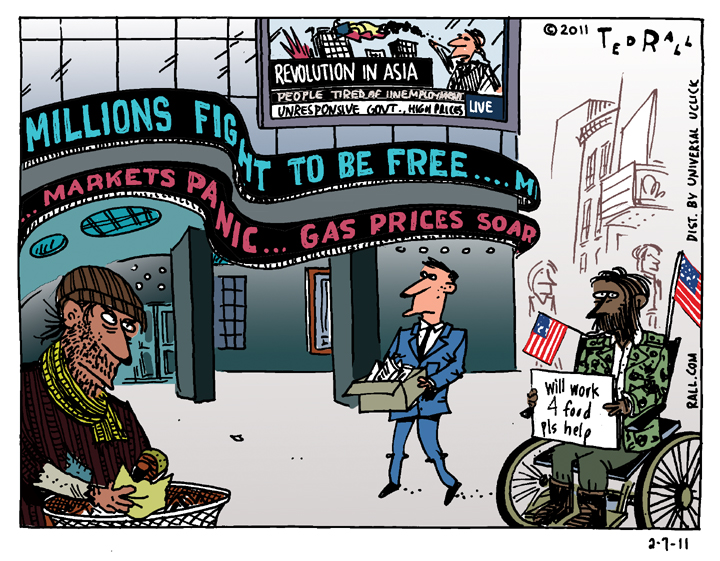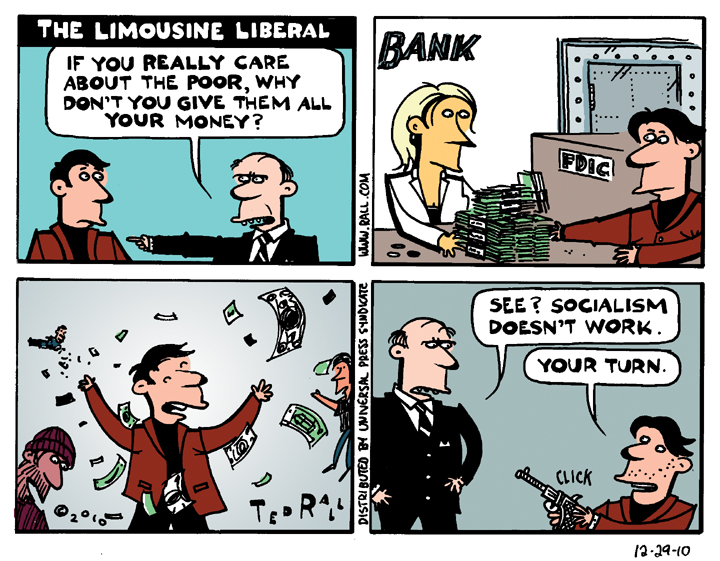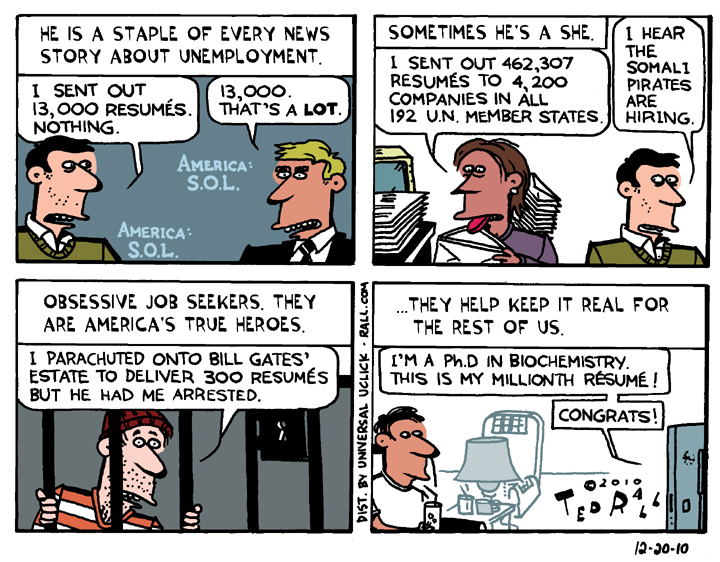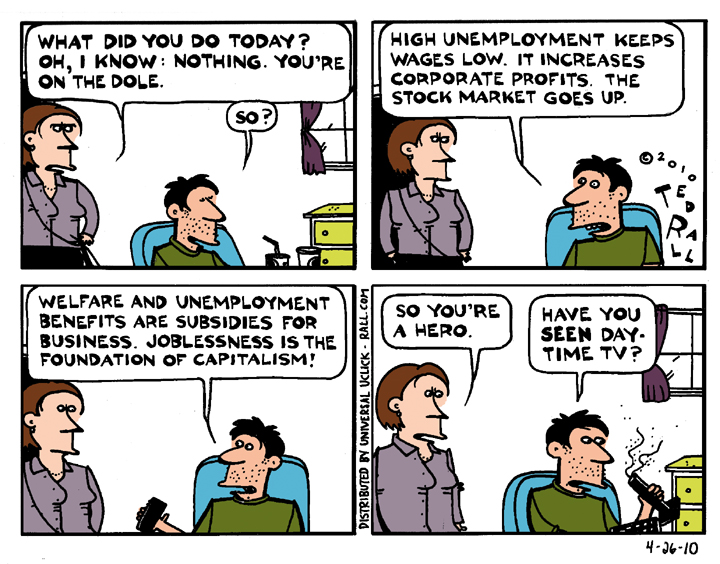Turmoil from Mideast to Midwest
If irony were money we’d be rich.
“You’ve got to get out ahead of change,” President Obama lectured a week ago. “You can’t be behind the curve.” He was, of course, referring to the Middle East. During the last few weeks there has been a new popular uprising every few days: Tunisia, Egypt, Yemen, Jordan, Bahrain, Libya.
And now, Wisconsin.
In Madison, where a new Republican governor wants to gut the rights of state workers to form unions and negotiate for higher wages, tens of thousands of protesters have filled the streets and sat in the State Capitol for days. “It’s like Cairo has moved to Madison these days,” said Congressman Paul Ryan (R-WI).
Revolutionary foment is on the march around the globe, but Mr. Hopey Changey is nowhere to be found now that it’s here in the U.S. Whatever happened to “get ahead of change?” What’s good for the Hosni isn’t good for the Barry.
Deploying his customary technocratic aloofness in the service of the usual screw-the-workers narrative, President Obama sided with the union-busters: “Everybody has to make some adjustments to the new fiscal realities,” he scolds.
“Everybody,” naturally, does not include ultrarich dudes like our multi-millionaire president. Obama, who declared a whopping $5.5 million in annual income for 2009 (the last year available), has neither reduced his salary nor donated a penny of his $7.7 million fortune to the Treasury to help adjust to those “new fiscal realities.”
Hard times, doncha know, are for the little people. “We had to [my italics] impose a freeze on pay increases for federal workers in the next two years as part of my overall budget freeze,” said Obama. “I think those kinds of adjustments are the right thing to do [in Wisconsin].”
“Had to.” Interesting pair of words. They imply that there was no other choice. What a brazen lie.
Three more words: Tax. The. Rich. Rich people and corporations are making out like bandits. If they paid their fair share, there’d be no need to cut budgets.
“Adjustments.” How bloodless. For normal people, Herr President, losing two percent of one’s pay is not a mere adjustment. It hurts.
Obama’s grandstanding had-to freeze on federal pay will save $5 billion over two years. Which is nothing. That’s what the Pentagon chucks down the Iraq and Afghanistan ratholes in a single week.
The federal deficit is $14 trillion. That’s $14,000 billion. Obama’s federal pay freeze, which amounts to a piddling four hundredths of one percent, is empty symbolism.
As the striking members of the PATCO air traffic controllers union learned in 1981, higher wages and working conditions are for foreigners, not Americans. Ronald Reagan had nothing but praise for Solidarity in Poland (declaring that “the right to belong to a free trade union” was “one of the most elemental human rights”).
At the same time he was defending Polish workers Reagan fired all of America’s 11,345 striking air traffic controllers and ordered their union decertified.
All political systems are built on contradictions that eventually lead to their downfall. The U.S. relies on a whopping chasm between soaring rhetoric (freedom, democracy, individual rights) and brutish reality (preemptive war, supporting dictators, torture, spying on citizens)—a gap that is so wide and so glaring that it is amazing anyone ever takes the propaganda seriously.
A recent report in The New York Times slathers on a rich quadruple serving of syrupy irony. The Obama Administration asked the CIA to prepare a secret memo about the revolutions in the Middle East, specifically analyzing “how to balance American strategic interests and the desire to avert broader instability against the democratic demands of the protesters.”
What, exactly, are those “strategic interests”? Business. Dictators cut sweetheart deals with big corporations that donate to the Democratic and the Republican parties.
Democracy—real democracy, the kind people are fighting for in Bahrain and Madison, is incompatible with free-market capitalism.
Which is what union members in Wisconsin, as well as those of us who don’t belong to unions but understand that we would be working 100-hour weeks in death-trap factories without them, see clearly. The American Dream is just that— a dream. And it’s not for Americans.
Obama’s statement about the Arab autarchies is astonishingly tone deaf to realities here at home. “I think that the thing that will actually achieve stability in that region is if young people, if ordinary folks, end up feeling that there are pathways for them to feed their families, get a decent job, get an education, aspire to a better life,” he said. “And the more steps these governments are taking to provide these avenues for mobility and opportunity, the more stable these countries are.”
Well, yes.
According to a recent Bloomberg National poll, most American adults believe that their children will have worse lives than they do.
That’s true even about those who have all the so-called advantages.
At this writing the unemployment rate for recent college graduates is 80.3 percent.
How will they pay their loans?
The rate is even higher for other young adults.
In a way, the unemployed and underemployed should thank Obama and the plutocrats he helps protect. The ruling classes’ shortsighted refusal to give up some of the loot they’ve stolen will soon bring about the real changes Americans require and deserve.
(Ted Rall is the author of “The Anti-American Manifesto.” His website is tedrall.com.)
COPYRIGHT 2011 TED RALL

